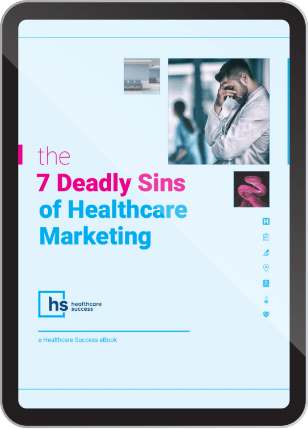Using the Six Principles of Persuasion in Healthcare Marketing

Dr Robert Cialdini
Some health care advertising agencies would have you believe that trendy and award-winning creative materials, intricate and expensive media plans, and enormous medical advertising budgets are what it takes to win the hearts and minds of new patients.
In fact there's more science and psychology at work in the business of influencing human behavior than one might realize. And what's more, the various principles of persuasion are not reserved for medical marketing, advertising or public relations.
Whether we realize it or not the same principles that work in medical practice and hospital marketing are part of our daily interactions. Physicians, surgeons and dentists, for example, use persuasion techniques in treatment recommendations winning patient compliance. Administrators influence and persuade while leading personnel and staff. Hospital marketing and other healthcare professionals encourage healthy living and lifestyles.
In face-to-face exchanges and in digital communications, in support of advertising objectives and in doctor-patient encounters, only a few concepts apply.
Cialdini's Six Principles of Persuasion
Some sources would list dozens of ways to influence people, but Robert B. Cialdini, PhD—perhaps the leading authority on the subject—lists only six Principles of Persuasion. These are:
- Reciprocity
- Commitment and consistency
- Social proof
- Liking
- Authority
- Scarcity
Marketing and advertising professionals recognize Dr. Cialdini for his expertise in the fields of persuasion, compliance and negotiation. He is Arizona State University Regents' Professor Emeritus of Psychology and Marketing, Department of Psychology, president of Influence at Work in Tempe, AZ, and the author of several highly regarded books.
Quite often people cannot explain the "how, when and why" of their own decisions such as selecting a healthcare provider or purchasing a product or service. But, as Dr. Cialdini has convincingly documented, it is a matter of science.
Understanding these principles allows healthcare providers and medical marketing professionals to influence decisions. As idea starters, here are a few notes about each of the six principles and how they might be useful.
RECIPROCITY: People are inclined to return a favor or repay in kind when they are given something. The act of receiving or accepting something (however small), such as a free sample or a trial offer, influences people to do something in return, including purchasing that which was sampled.
For marketing to consider: The classic extension of reciprocity is the popularity of free or deeply discounted samples that, once tried, frequently lead to a regular purchase. Healthcare "samples" can include situations where the patient "experiences" the practice or provider service in a small way. Examples include a dental cleaning, a plastic surgeon selling topicals, an ophthalmolgist selling prescription sunglasses, an unexpected small gift, or even information or delivering an exceptionally positive experience in the first visit.
COMMITMENT AND CONSISTENCY: Having made a commitment (or choice), people want to stick with it. Their oral or written commitment—what they believe is the correct thing to do—is a desire to remain true to the decision/conviction, or conversely, to not be seen as inconsistent or even untrustworthy. Public commitments are especially effective.
For marketing to consider: In order for people to say "yes" (making the commitment), it's first necessary to ask. Although asking is surprisingly easy, it's often overlooked. As one example, patients who are given instructions may understand what they are being told. But winning patient compliance with a course of treatment will be more effective if asked, "Can I count on you to do [this] until our next appointment?"
It's also possible to achieve larger changes in behavior by starting with a smaller initial request. The goal of a regular exercise regimen might be achieved by asking the patient to begin by simply walking the dog twice daily. When they own the "exercise" decision it is more likely to be sustained.
SOCIAL PROOF: People will learn from others regarding the correct thing to do. What others are doing validates "the right thing," and people will do those things they see other people doing. (After all, it must be "right.") This is especially true when a person is extremely uncertain about what's going on, or when people are observing the behavior of others just like themselves.
For marketing to consider: Faced with questions or uncertainty, people are guided by knowing what others have decided or are doing. Patient testimonials, referrals and word-of-mouth are the obvious examples, especially when they are seen as coming from peers or other members of the target audience. The popularity of various social media platforms, such as Facebook, is due in part to "social proof," as well as the following principle.
LIKING:People are more easily persuaded by the requests of people they know and like. (As the saying goes, people like doing business with people they know and like. Ask any salesman.) Likeability can be physical attractiveness, similarity to themselves (age, appearance, interests), familiarity, having mutual goals, responding to compliments, appearance of truthfulness and other factors.
For marketing to consider: Terms such as "patient satisfaction" and "engaging patients"—through social media or other means—is evidence of "liking." Social media's "like" and "follow" options are, not surprisingly, examples of the Principle of Liking. More commonly, however, people tend to like-and respond to-situations where they feel a benefit is derived from a provider, a service or a product. So, while it helps to have the good looks of a TV actor, it is also helpful to identify with the target audience and to show how the product or service delivers benefits to others like themselves.
AUTHORITY: People are inclined to respond to, respect and be influenced by authority figures. In some instances this can extend to the appearance of authority or responding to titles or symbols of authority such as a white coat or orange vest.
For marketing to consider: Titles and white coats are often a given in healthcare; everyone's got the same authority symbols. Therefore other points of distinction and differentiation (also part of branding) are needed to communicate credibility as an expert or authoritative expert. Being an author, teacher, leader and/or having the endorsement of other experts are further symbols that influence and persuade.
SCARCITY: That which is less available or in short supply is seen as having greater value. This applies to objects (gold, for example), a limited quantity or a "limited time" offer. (Briefly available opportunities appear to have greater value due to the risk of being lost without immediate action.) Further, when a product or service is one of a kind, or when the benefits are unique, this can also be an expression of scarcity.
For marketing to consider: Being rare (few in number) immediately implies greater value (and possibly a higher price tag.) But the stronger concept may be that someone will suffer a loss in not acting or capturing a (rare) opportunity. Hence advertising messages that warn, "Don't miss out..." or "Here's what you'll be missing...".
Dr. Cialdini's books are a respected resource for healthcare marketing. For further reading, see Influence: Science and Practice (5th Edition) [Paperback] by Robert B. Cialdini, available on Amazon. And see this related article about branding on the Healthcare Success website.








